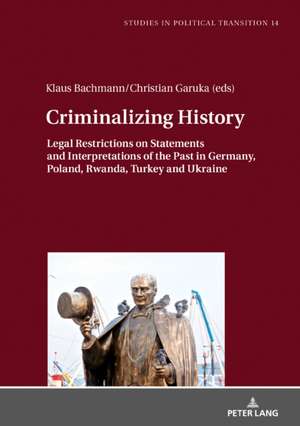Criminalizing History: Studies in Political Transition
en Limba Engleză Hardback – apr 2020
Preț: 504.43 lei
Nou
Puncte Express: 757
Preț estimativ în valută:
96.52€ • 105.18$ • 81.33£
96.52€ • 105.18$ • 81.33£
Carte tipărită la comandă
Livrare economică 23 aprilie-07 mai
Preluare comenzi: 021 569.72.76
Specificații
ISBN-13: 9783631809570
ISBN-10: 3631809573
Pagini: 182
Dimensiuni: 148 x 210 mm
Greutate: 0.39 kg
Editura: Peter Lang Copyright AG
Seria Studies in Political Transition
ISBN-10: 3631809573
Pagini: 182
Dimensiuni: 148 x 210 mm
Greutate: 0.39 kg
Editura: Peter Lang Copyright AG
Seria Studies in Political Transition
Notă biografică
Klaus Bachmann is professor of social sciences at SWPS University of Social Sci -ences and Humanities in Warsaw, Poland. His research concentrates on Inter-national Criminal Justice, Modern European History and European Integration.
Christian Garuka is Lawyer and defence counsellor in Kigali, Rwanda.
Cuprins
Memory laws, politics of history, Holocaust denial, Rwanda, Ukraine, Germany, Poland, Turkey, genocide ideology, denialism, lustration, communism, Holocaust, defamation
Descriere
More and more countries have passed legislation which punishes the use of controversial statements and interpretations of the past, often going much beyond the scope of legislation forbidding Holocaust denial.









